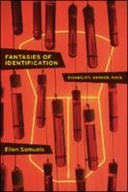Explore

Explores the roots of modern understandings of bodily identity In the mid-nineteenth-century United States, as it became increasingly difficult to distinguish between bodies understood as black, white, or Indian; able-bodied or disabled; and male or female, intense efforts emerged to define these identities as biologically distinct and scientifically verifiable in a literally marked body. Combining literary analysis, legal history, and visual culture, Ellen Samuels traces the evolution of the “fantasy of identification”—the powerful belief that embodied social identities are fixed, verifiable, and visible through modern science. From birthmarks and fingerprints to blood quantum and DNA, she examines how this fantasy has circulated between cultural representations, law, science, and policy to become one of the most powerfully institutionalized ideologies of modern society. Yet, as Samuels demonstrates, in every case, the fantasy distorts its claimed scientific basis, substituting subjective language for claimed objective fact. From its early emergence in discourses about disability fakery and fugitive slaves in the nineteenth century to its most recent manifestation in the question of sex testing at the 2012 Olympic Games, Fantasies of Identification explores the roots of modern understandings of bodily identity.
This book is included in DOAB.
Why read this book? Have your say.
You must be logged in to comment.
Rights Information
Are you the author or publisher of this work? If so, you can claim it as yours by registering as an Unglue.it rights holder.Downloads
This work has been downloaded 36 times via unglue.it ebook links.
- 11 - epub (CC BY-NC-SA) at OAPEN Library.
- 25 - pdf (CC BY-NC-SA) at Unglue.it.
Keywords
- Gender studies, gender groups
- Social and cultural anthropology
- thema EDItEUR::J Society and Social Sciences::JB Society and culture: general::JBS Social groups, communities and identities::JBSF Gender studies, gender groups
- thema EDItEUR::J Society and Social Sciences::JH Sociology and anthropology::JHM Anthropology::JHMC Social and cultural anthropology
Links
DOI: 10.18574/nyu/9781479855049.001.0001Editions

